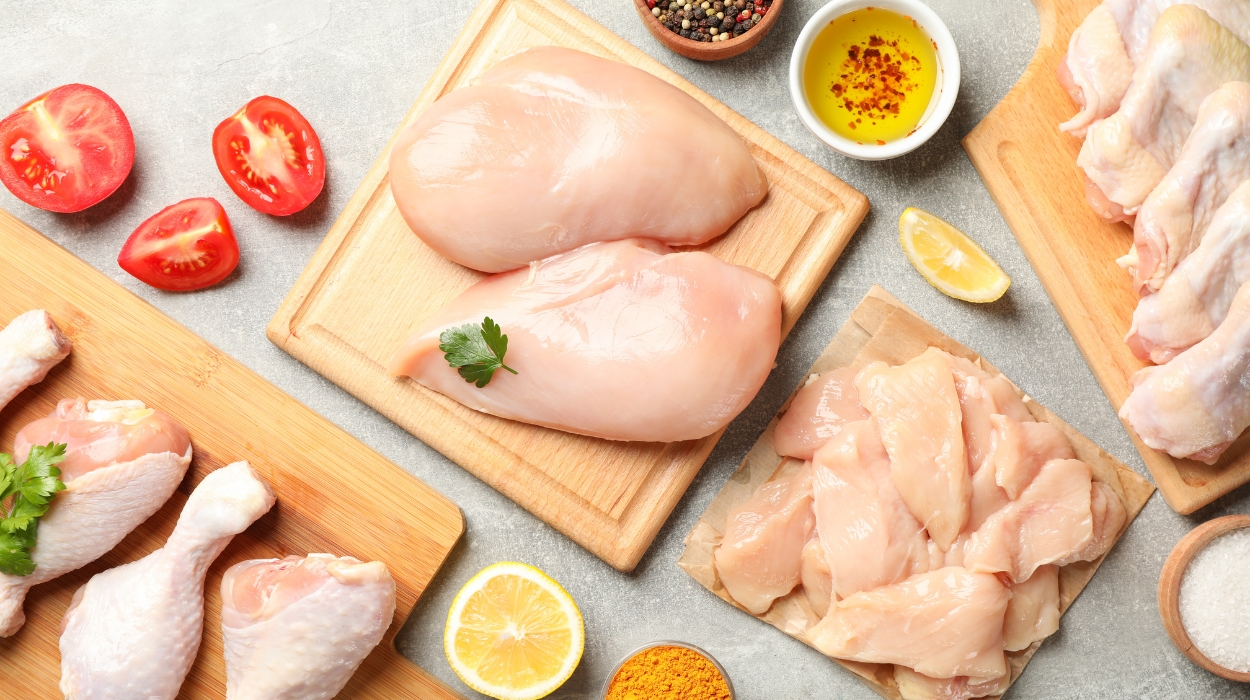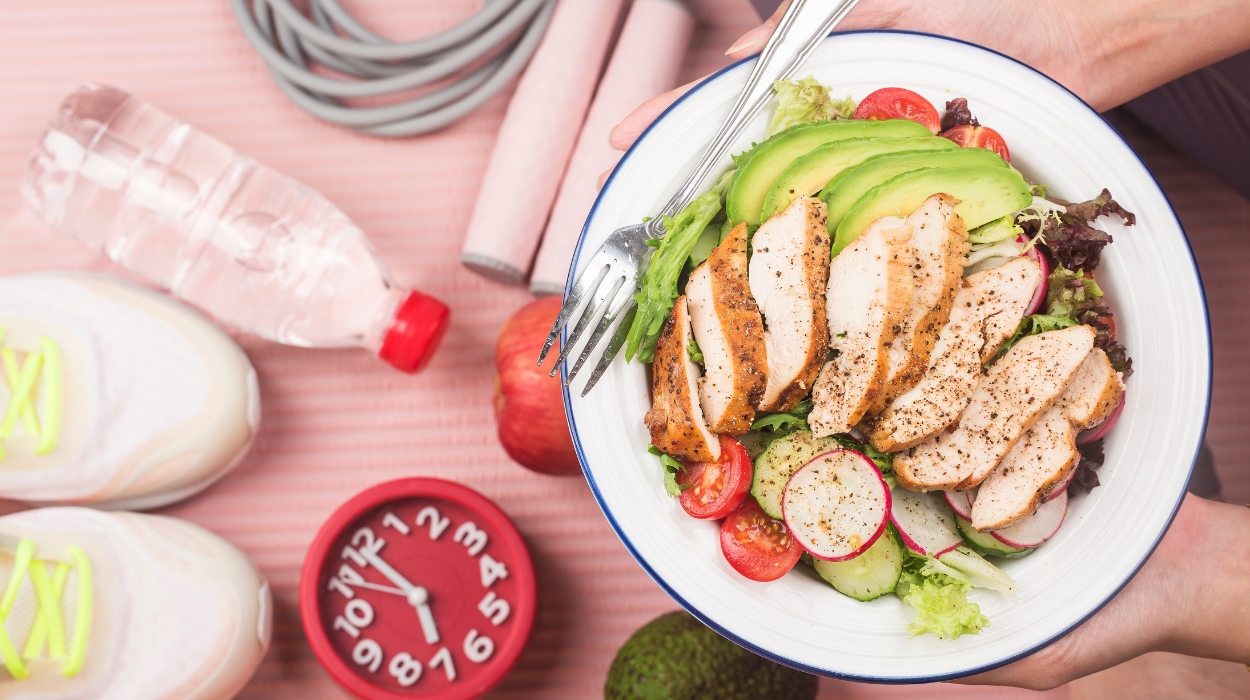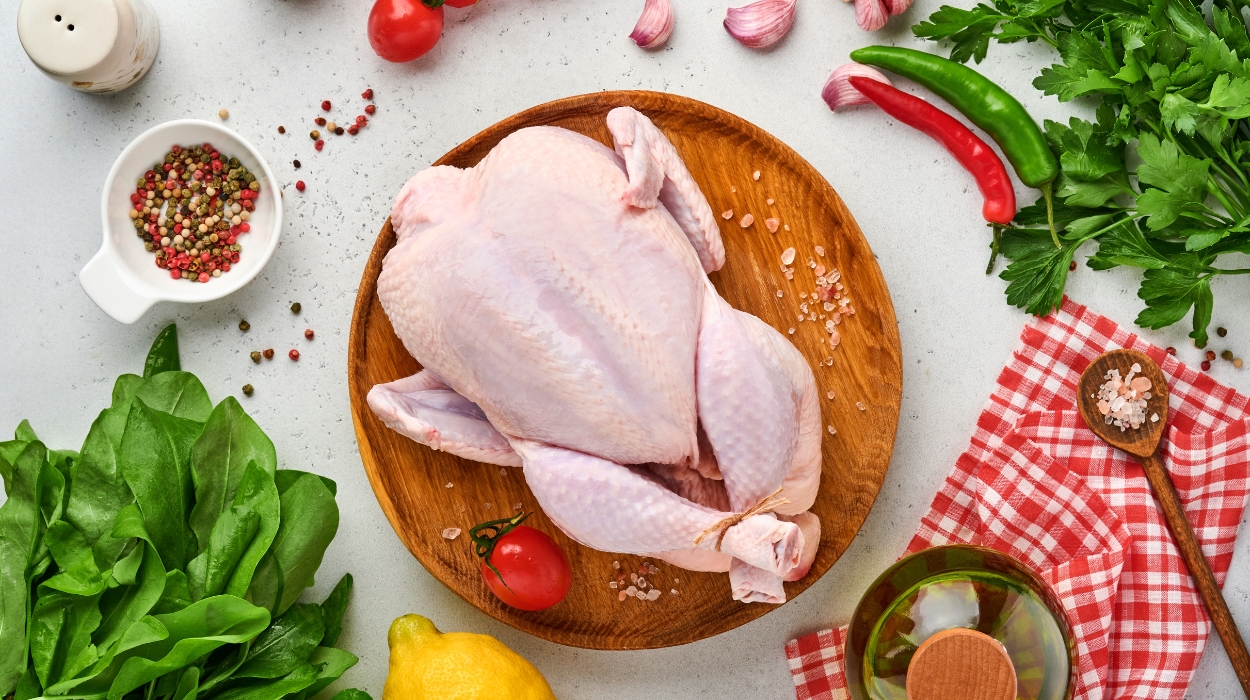Widely popular worldwide, chicken stands out as a versatile lean meat option for various dishes. Whether roasted, grilled, fried, or baked, chicken offers a wide variety of tastes and textures to please many palates.
Beyond its culinary appeal, chicken is renowned for its health benefits, particularly for weight loss. With its optimal nutritional profile for weight loss diets, many people incorporate chicken in their diet as a good meat for weight loss option. But how is chicken good for weight loss?
In this article, we will look at the research behind the weight loss benefits of chicken, its impact on health, and how you can incorporate it into your diet. We will also examine the risks of overeating chicken and whether following the chicken diet is good for sustainable weight loss.
Is Chicken Good To Lose Weight?
Chicken is a great option for weight loss due to its high protein, low-calorie content and versatility. Its lean protein promotes satiety, boosts metabolism, and supports muscle recovery. Certain cuts, like skinless chicken breasts, are healthier options compared to thighs or drumsticks. Grilling or roasting are better cooking options for weight loss compared to frying.
There are several risks of overconsumption, including nutritional imbalances and potentially unhealthy eating habits. Moderation, balanced nutrition, and an active lifestyle are key to losing weight. Always consider your individualized needs and consult a healthcare professional before starting a new diet.
Is Chicken Good For Weight Loss?

Long hailed by health and fitness enthusiasts alike, chicken is often a component of weight loss diets. You may be wondering, “How good chicken is for losing weight?” Let’s dive into this in more detail.
Chicken Nutritional Value
First and foremost, chicken is lean meat and relatively low in calories, with around 165 calories[1] per 100 grams of breast meat. Chicken is also a great source of protein, and a serving of 100 grams contains around 31 grams of protein.[1] Research shows that diets high in protein are great for weight loss,[2] as they help you feel fuller for longer.
Chicken also naturally contains zero carbohydrates,[1] making it a great option if you’re trying to reduce your carbohydrate intake. Following a low-carbohydrate diet can be a great way to lose weight[3] because it can help you eat fewer calories.
The fat content of chicken can vary depending on what type you eat. Skinless chicken breast is relatively low in fat, containing about 3.5 grams[1] per 100 grams of meat. Eating the skin or using cooking methods that use excessive oil will increase chicken’s fat and overall calories.
Chicken is a great source of iron, which is essential for transporting oxygen throughout the body and overall health.[4]
Benefits Of Chicken For Weight Loss
Chicken is a relatively low-calorie lean meat, making it easier to achieve successful weight loss. Studies consistently show that you need to be in a calorie deficit to promote weight loss.[5]
Chicken’s high protein content is a key player in its ability to support weight loss. Consuming chicken promotes fullness and supports post-workout recovery and the preservation of lean muscle mass[6] and muscle growth. Preserving lean body mass is important for a healthy metabolism as you can burn more calories[7] at rest, supporting weight loss efforts.
Compared to other processed meats and red meat, chicken is a heart-healthy alternative. Chicken has less saturated fat and cholesterol than red meat and has more healthy fats.[8]
While increasing your chicken consumption is a positive step, it’s important to remember that it won’t directly cause weight loss. Sustainable weight loss requires a well-balanced diet, watching your calorie intake, avoiding certain foods, and regular exercise.
If you’re facing challenges with your weight loss journey, it’s worth considering that supplements and fat burners available on the market may offer support. However, it’s crucial to approach these with caution and speak to a health professional before incorporating them into your routine.
Ways To Eat Chicken For Weight Loss Diet

When eating chicken for weight loss, it’s essential to know the best cooking methods that align with your weight loss goals. Grilling or roasting over frying is a healthier choice to promote weight loss. These cooking methods minimize the addition of excess unhealthy fats, meaning you eat fewer calories.
Opting for skinless cuts is a healthier choice as it reduces fat content. Leaner cuts like skinless chicken breast are better suited for weight loss diets as they are high in protein and low in calories and fat. Chicken thighs and drumsticks, while higher in fat,[9] can be part of a well-balanced diet when consumed occasionally.
While frying chicken is popular, it may not align with weight loss goals due to its increased fat and calorie content. Fried chicken contains 267 calories[10] and 17 grams of fat per 100 grams. Many studies have linked fried food consumption to diseases, including cardiovascular diseases.[11] Eating fried food regularly is also linked to weight gain,[12] highlighting the importance of choosing healthier cooking methods.
Rotisserie chicken can be a good weight-loss choice due to its convenience and high protein content. While it’s generally lean, be mindful of seasoning and the skin, as added fats may affect your weight loss goals. Opt for skinless cuts and pair with vegetables for a well-balanced meal.
Finding ways to incorporate chicken into your diet for weight loss can be challenging, but we’re here to help! Here are some tasty ways to prepare chicken to keep you on track towards your weight loss goals.
FRESH CHICKEN SALAD
Ingredients:
- 1 cup grilled chicken breast strips.
- 2 cups mixed leafy greens.
- 1 cup cherry tomatoes, halved.
- 1 cucumber, sliced.
- 1 bell pepper, diced.
- Fresh herbs (cilantro or parsley), chopped.
For the vinaigrette:
- 3 tablespoons olive oil.
- 1 tablespoon lemon juice.
- 1 teaspoon Dijon mustard.
- Salt and pepper to taste.
Instructions:
- In a large bowl, mix the grilled chicken, mixed greens, cherry tomatoes, cucumber, and bell pepper.
- In a bowl, mix together the oil, lemon juice, Dijon mustard, salt, and pepper to create the vinaigrette.
- Drizzle the vinaigrette over the salad and toss gently to coat all the ingredients evenly.
- Sprinkle the chopped herbs on top for an extra burst of freshness and serve immediately.
GRILLED CHICKEN AND BROWN RICE BOWL
Ingredients:
- 1 cup brown rice, cooked.
- 1 boneless chicken breast, sliced.
- 1 cup broccoli florets, steamed.
- 1 red bell pepper, thinly sliced.
- 1 carrot, diced.
- 1 tablespoon olive oil.
- 2 cloves garlic, minced.
- 1 teaspoon ginger, grated.
- 2 tablespoons soy sauce.
- 1 tablespoon rice wine vinegar.
- Sesame seeds and chopped green onions for garnish.
Instructions:
- In a large pan, heat the olive oil over medium heat. Add the minced garlic and grated ginger, frying until fragrant.
- Add the sliced chicken to the pan and cook until browned and fully cooked. Remove the chicken from the pan and set aside.
- In the same pan, add the sliced bell pepper and diced carrot. Cook for a few minutes until they start to soften but remain crisp.
- Stir in the steamed broccoli and cooked chicken, combining all the ingredients in the pan.
- In a small bowl, whisk together the soy sauce and rice vinegar. Pour the sauce over the chicken and vegetables, tossing to coat evenly.
- Place a serving of brown rice in bowls, then top with the chicken and vegetable mixture.
- Garnish with sesame seeds and chopped green onions for added flavor and freshness. Serve immediately.
LEMON HERB BAKED CHICKEN WITH QUINOA AND ROASTED VEGETABLES
Ingredients:
- 1 pound of boneless, skinless chicken breasts.
- 1 cup quinoa, cooked.
- Assorted vegetables (e.g. cherry tomatoes, zucchini, bell peppers).
- 2 tablespoons olive oil.
- 1 lemon (juiced).
- Fresh herbs (e.g. rosemary, thyme, or parsley).
- Salt and pepper to taste.
Instructions:
- Preheat the oven to 375°F (190°C).
- Season chicken breasts with salt, pepper, and fresh herbs. Place them in a baking dish.
- Toss the assorted vegetables in olive oil, salt, and pepper. Arrange them around the chicken in the baking dish.
- Drizzle the chicken and vegetables with lemon juice.
- Bake for around 30 minutes or until the chicken is cooked through and the vegetables are tender.
- Serve with the cooked quinoa and consume immediately.
What Is The Chicken Diet?
The chicken diet is a simplistic diet that revolves around the exclusive consumption of chicken. Due to chicken’s high protein and low-fat nature, this diet has received attention as a potential strategy for rapid weight loss.
People choosing this diet often do so to cause a calorie deficit to promote weight loss. The chicken diet doesn’t usually recommend portion-size restrictions, making it an attractive option if you don’t like tracking portion sizes.
The diet’s primary advantage is its simplicity, as it requires no tracking of the major food groups. As mentioned, chicken is rich in protein and low in calories, making it a great weight-loss choice.
However, the diet’s drawbacks are substantial. It eliminates diverse food groups, potentially leading to nutrient deficiencies and unhealthy eating habits. Also, the restrictiveness and monotony of solely consuming chicken can make it difficult to stay on track.
While the chicken diet may cause temporary weight loss, its associated risks make it an unsuitable and potentially harmful approach. A balanced, nutrient-rich diet coupled with a consistent calorie deficit is the most sustainable approach for weight loss. As with any diet, seek guidance from a healthcare professional to make an informed and healthy decision.
Chicken Overconsumption Risk
While chicken is a lean and protein-rich option, overindulging may pose some risks to your well-being.
Over-reliance on chicken might result in an imbalanced nutrient profile, as chicken lacks certain essential nutrients in other food groups. Replacing other foods with chicken may lead to deficiencies in vital vitamins and minerals, negatively impacting your health.[13]
The risks associated with overeating chicken extend beyond the meat itself to the cooking methods used. Frequent fried or processed chicken consumption can introduce too much fat and sodium into your diet, potentially causing weight gain.
While chicken can be a valuable component of a balanced diet, moderation is key. Overeating chicken can lead to nutritional imbalances and potential health risks. Try and strive for a well-balanced, nutritious diet, incorporating various protein sources, vegetables, fruits, legumes, and whole grains.
Conclusion
Incorporating chicken into your diet can support weight loss because of its high protein and low-calorie content. It is important to be mindful of cooking methods when preparing chicken, with roasted and grilled chicken being good for weight loss. Try to reduce your intake of fried chicken to keep your fat intake low and to remain in a calorie deficit.
Sustainable weight loss is most successful with a combination of a balanced diet and regular exercise. Including chicken in your meals can prove to be a great part of a weight loss diet that also contributes to overall well-being.
Frequently Asked Questions
While chicken won’t directly cause belly fat loss, its nutritional profile can support this. Eating chicken can promote satiety, boost metabolism, and preserve lean muscle mass.
Yes, chicken breast is a good choice for weight loss. It’s a lean meat that’s high in protein and low in fat and calories compared to other processed options.
The recommended amount of chicken for weight loss will vary depending on your lifestyle and personal factors. A serving of 100 grams, roughly the size of a deck of cards, is a sensible portion.
Eating chicken every day is okay as part of a balanced diet. Try and use healthier cooking methods, such as grilling and roasting. Remember to include other food groups in your diet.
 Evidence Based
Evidence Based